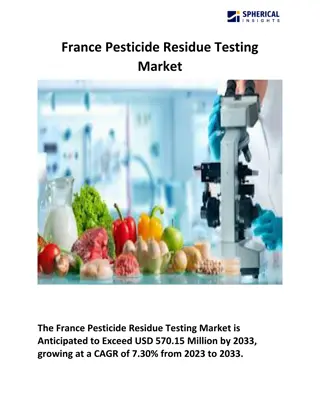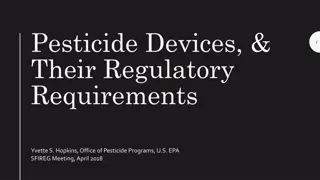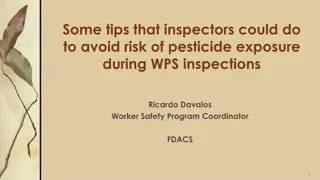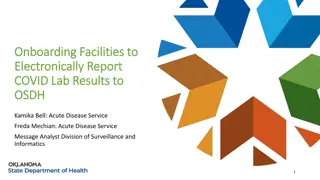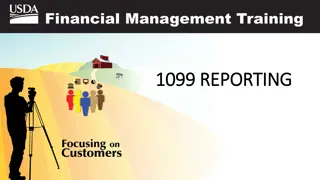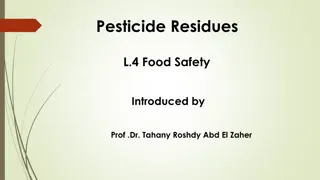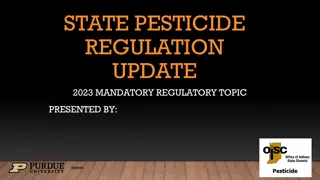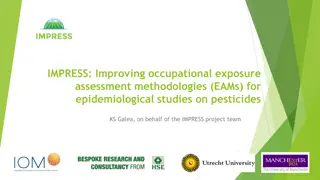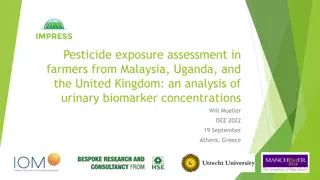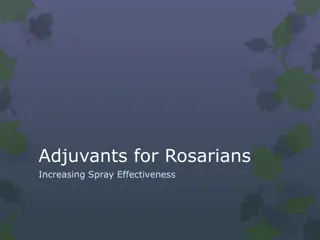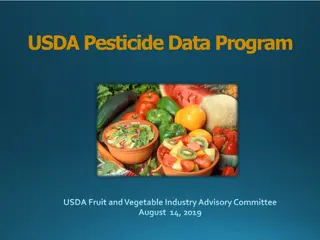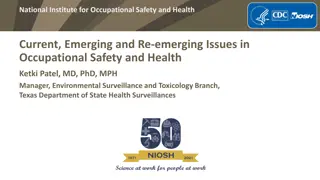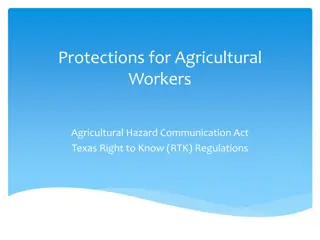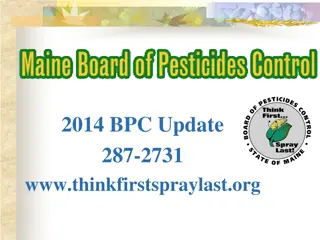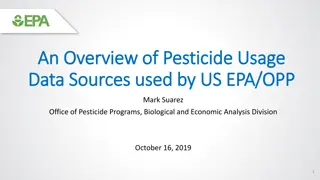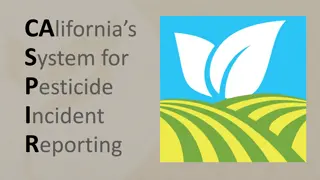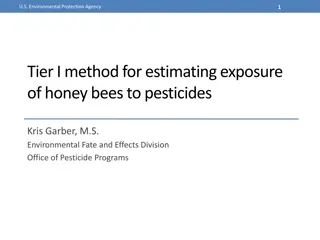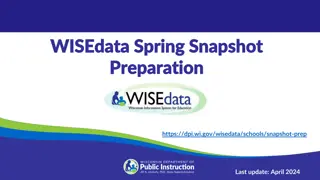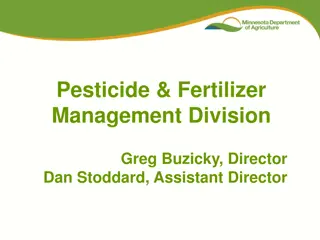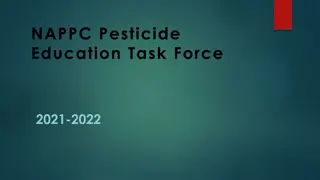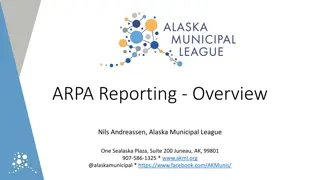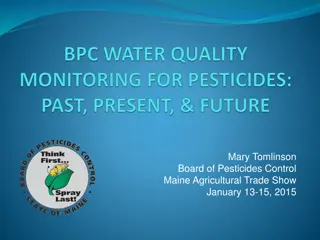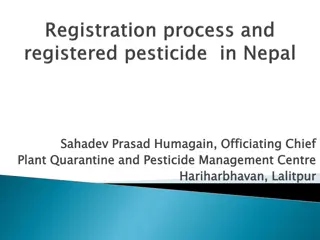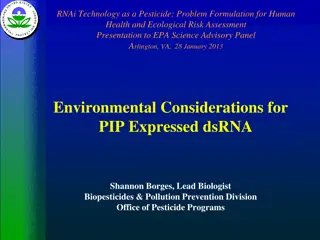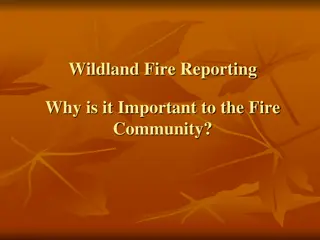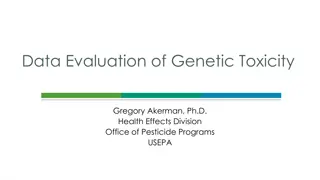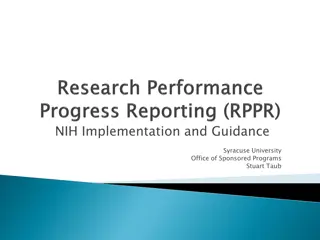Sustainable Rice Production in Pakistan: Challenges and Strategies
Pakistan's economy heavily relies on rice exports, with the country being a significant producer and exporter. However, challenges such as pesticide residues, major insect pests, and diseases threaten rice production. Key parameters for production include cultivation of improved varieties, pest mana
2 views • 42 slides
ECC Social Value Reporting and Evaluation Framework
Essex County Council (ECC) has implemented a robust Social Value Reporting and Evaluation framework based on the Local Government Association's National TOMs method. This framework categorizes and assesses social value contributions in two parts - Value Score and Supporting Statement Score - to deri
3 views • 16 slides
Importance of Integrating Sustainability Reporting in Government Accounting
Sustainability reporting in government accounting in Africa promotes transparency, supports Sustainable Development Goals, attracts investments, manages resources, enhances efficiency, and fosters partnerships. The role of government accounting is crucial for transparent and sustainable governance t
3 views • 9 slides
Overview of Fall 2019 Reporting Information Session
High-level overview of TRS reporting for Fall 2019 including legislative changes, summary of rate changes for fiscal years, tips on starting a new year, and additional reporting tips. The presentation emphasizes the importance of accurate reporting and compliance with TRS Laws and Rules. Ensure time
1 views • 29 slides
Mandatory Reporting Guidelines for Suspected Child Abuse/Neglect
Understanding mandatory reporting requirements for child abuse and neglect is crucial for various professionals and individuals working with children. This content emphasizes the legal obligations and procedures involved in reporting suspected cases, ensuring immunity for those reporting in good fai
1 views • 6 slides
France Pesticide Residue Testing Market
The France Pesticide Residue Testing Market is Anticipated to Exceed USD 570.15 Million by 2033, growing at a CAGR of 7.30% from 2023 to 2033.\u00a0\n
0 views • 4 slides
Understanding Regulatory Requirements for Pesticide Devices
Pesticide devices, as defined by FIFRA, play a crucial role in trapping, destroying, repelling, or mitigating pests or plant and animal life. While not required to be registered with the EPA, these devices are regulated under FIFRA sections 2(q)(1), 7, and 8, with specific labeling and packaging req
0 views • 10 slides
Tips to Prevent Pesticide Exposure During WPS Inspections
Inspectors should be familiar with establishment operations, inquire about pesticide use, avoid entering treated areas without assurance, wear proper PPE, identify decontamination supplies, and practice good hygiene to minimize the risk of pesticide exposure during inspections. These precautions hel
5 views • 10 slides
Streamlining Electronic Reporting of COVID Lab Results to OSDH
This documentation outlines the process of electronically reporting COVID lab results to the Oklahoma State Department of Health (OSDH). It covers the purpose, available options, specifications, formats, and the onboarding and testing process, aiming to accelerate the reporting of healthcare facilit
0 views • 9 slides
Overview of 1099 Reporting Systems
The 1099 Reporting Systems consist of MINC, EARN, and SPPS, which are used for IRS 1099 reporting purposes. These systems handle transactions and generate Form 1099 for recipients based on predefined criteria. Taxpayers are responsible for accurate reporting to the IRS, with reporting thresholds set
0 views • 15 slides
Extraction Methods in Pesticide Residue Analysis for Food Safety
Extraction methods play a crucial role in separating pesticide residues from food matrices for analysis. Techniques involve using solvents to efficiently remove pesticides without causing chemical changes. The choice of extraction method depends on the substrate type, with liquid and solid substrate
6 views • 25 slides
UNEP Support for Improving UNCCD Reporting Procedures
UNEP has been providing support since 2010 to enhance the reporting processes of the UNCCD, focusing on streamlined funding approaches, technical assistance, and capacity building. Key outcomes include the development of reporting tools, online reporting systems, and building credible data from coun
0 views • 14 slides
State Pesticide Regulation Update 2023: Mandatory Changes and Stakeholder Involvement
The State Pesticide Regulation Update for 2023 brings significant changes including Restricted Use Pesticide applications, record-keeping requirements, and supervision of applicators. The revisions were prompted by applicator certification and training rules set by the EPA, along with public awarene
0 views • 25 slides
Climate Change Monitoring, Reporting, and Verification (MRV) Training Session Overview
This document outlines the purpose and reporting requirements for the development of a Climate Change Monitoring, Reporting, and Verification (MRV) system, focusing on projections and scenarios. It highlights the importance of collecting information for climate mitigation, assisting Serbia in meetin
0 views • 19 slides
Enhancing Pesticide Exposure Assessment for Epidemiological Studies
Focuses on IMPRESS project aiming to improve methodologies for assessing occupational pesticide exposure in epidemiological studies. Reviews challenges in retrospective exposure assessment, proposes methodologies, and presents key project results to date, emphasizing the use of various exposure asse
1 views • 15 slides
Pesticide Exposure Assessment in Farmers from Malaysia, Uganda, and the United Kingdom
This study evaluates the impact of pesticide exposure on farmers' health in Malaysia, Uganda, and the UK using urinary biomarker concentrations. Multiple cohorts are analyzed to assess associations between exposure-modifying factors and urine metabolite measurements. The IMPRESS project focuses on i
0 views • 12 slides
Transitioning to Incident-Based Crime Reporting: Enhancing Transparency and Accountability
Anytown Police Department (APD) is leading the transition from Summary Reporting to Incident-Based Reporting through the National Incident-Based Reporting System (NIBRS). This change promotes transparency, provides detailed crime data to the public, and improves statewide and national crime statisti
3 views • 17 slides
Insights into Structured Reporting Practices in Colorectal Cancer Imaging
A survey conducted by Dr. Eric Loveday at North Bristol NHS Trust revealed the current landscape of structured reporting in MRI and CT scans for rectal and colon cancer. Results indicate a positive outlook towards implementing national standards for structured radiology reporting, with an emphasis o
0 views • 7 slides
Enhancing Pesticide Spray Effectiveness with Adjuvants for Rosarians
Adjuvants play a crucial role in improving the efficacy of pesticide applications for rosarians. They aid in maximizing the impact of pesticides by enhancing their application process. Various types of adjuvants, such as surfactants, extenders, and penetrants, serve different purposes like adjusting
0 views • 11 slides
USDA Pesticide Data Program Overview
The USDA Pesticide Data Program (PDP) provides high-quality pesticide residue data for US foods to support regulatory decision-making and ensure food safety. Through cooperative agreements with participating states, the program conducts sampling of various commodities, including fresh fruits and veg
0 views • 17 slides
Occupational Pesticide Safety and Health Concerns
Occupational safety and health issues related to pesticide exposure are a significant concern globally. Limited surveillance data on pesticide exposure and related illnesses are available, with a high percentage of farmers being affected annually. Various occupations beyond farming also face potenti
1 views • 25 slides
Agricultural Workers' Protections under Right-to-Know Regulations
Agricultural workers in Texas have rights under the Agricultural Hazard Communication Act, also known as Right-to-Know (RTK) Law. This Act ensures that agricultural workers receive essential information regarding pesticide exposure, workplace chemicals, and their entitlement to health and safety det
0 views • 15 slides
Important Updates in Pesticide Regulations and Program Changes
New pesticide regulations and program changes are introduced, including requirements for obtaining a pesticide applicator license, major proposed changes to the Worker Protection Standard (WPS) by the EPA, introduction of new inspectors, and the phaseout of Endosulfan. Special Maine registrations fo
0 views • 66 slides
Understanding Pesticide Data Collection and Analysis
Pesticide data usage is crucial for accurate assessments and prioritization of areas with high likelihood of usage. Various sources, quality requirements, and data considerations are highlighted, emphasizing the importance of incorporating usage data for informed decision-making.
0 views • 12 slides
Essential Facilities in a Bio-Pesticide Laboratory for Smart Agriculture
Establishing a bio-pesticide laboratory is vital for research, development, and mass production of bio-pesticides. Key rooms include sterilization, media preparation, inoculation, growth chamber, mixing, insect rearing, and washing rooms. The sterilization room houses equipment like autoclave and ho
0 views • 10 slides
California's System for Pesticide Incident Reporting Overview
Explore California's CASPIR system for reporting pesticide incidents, designed to enhance communication between counties, DPR, and fieldworker groups. The system's timeline, purpose, and key features, including incident report submission, intelligent case routing, mobile app functionality, and admin
0 views • 33 slides
Simpler Systems Reporting Pilot for Financial Data Enhancement
The Simpler Systems Reporting Pilot is underway to enhance financial data reporting at the university campus. Led by Vice President Ryan Nesbit's team, this initiative aims to improve University-wide financial reporting mechanisms and accessibility to data through the Simpler tool. The pilot include
0 views • 5 slides
U.S. EPA Tier I Method for Bee Pesticide Exposure Estimation
Tier I assessment by the U.S. Environmental Protection Agency focuses on generating conservative estimates of pesticide exposures to honey bees. The goal is to differentiate pesticides that pose risks to bees from those needing further evaluation. The process involves considering food consumption ra
0 views • 53 slides
Overview of WISEdata Snapshot Preparation and Reporting Requirements
The WISEdata Snapshot Preparation provides crucial details on data entry, validation, and reporting processes for educational institutions. It outlines the importance of accurate data collection for federal reporting, public reporting, and funding determinations. Additionally, the Snapshot Reporting
0 views • 41 slides
Ensuring Chemical Reporting and Preparedness at the DEQ
The Chemical Reporting and Preparedness section at the DEQ focuses on regulations under EPCRA, prompted by incidents like the Bhopal tragedy. EPCRA covers Tier II reporting, spill reporting, LEPCs, State Emergency Response Commission, and Oklahoma Hazardous Materials Emergency Response Commission. T
0 views • 17 slides
Pesticide & Fertilizer Management Division Overview
The Pesticide & Fertilizer Management Division is a key state agency in Minnesota responsible for regulating pesticides and fertilizers, protecting groundwater, responding to emergencies, managing spills, and promoting agricultural water quality. The division works with farmers, industry stakeholder
0 views • 11 slides
NAPPC Pesticide Education Task Force 2021-2022 Summary
The NAPPC Pesticide Education Task Force for 2021-2022 aims to utilize pesticide registration and regulation as tools to safeguard and enhance pollinator health. The task force focuses on educating various audiences, including pesticide applicators, farmers, homeowners, educators, and state departme
1 views • 15 slides
ARPA Reporting Overview and SLFRF Guidelines in Alaska
This document outlines the reporting overview for the ARPA (American Rescue Plan Act) and specific guidelines for the Coronavirus State and Local Fiscal Recovery Fund (SLFRF) in Alaska. It covers acceptance, use, and reporting of funds, as well as designating staff roles for managing reports. The co
2 views • 22 slides
Exploring Pesticide Monitoring and Contamination Studies in Maine
Mary Tomlinson's work with the Maine Board of Pesticides Control includes past studies on groundwater and surface water monitoring, ongoing monitoring initiatives, and future collaborative studies. The State Law mandates residue surveys to identify possible contamination sources and develop a pestic
1 views • 55 slides
Procedures and Management of Pesticide Registration in Nepal
This content provides detailed information on the registration procedures, management, and regulation of pesticides in Nepal. It covers the registration method, advantages of analogous registration, banned pesticides list, types of pesticides, and essential documentation requirements for pesticide r
0 views • 43 slides
Understanding Environmental Risks of RNAi Technology as a Pesticide
This presentation discusses the environmental considerations and risk assessments associated with RNAi technology as a pesticide, focusing on the unique challenges presented by dsRNA PIPs. Topics covered include ecological risk assessments, nontarget organism exposure, exposure assessments for PIP p
0 views • 13 slides
Feedback Analysis on Medication Incident Reporting in Hospitals
Feedback received from IMSN members on NIMS and incident reporting revealed various issues affecting the rates at which staff report medication incidents/near misses within hospitals. Major themes included staffing numbers and turnover, pharmacist involvement in incident reporting, clinical pharmacy
0 views • 12 slides
Importance of Wildland Fire Reporting to the Fire Community
Wildland fire reporting plays a critical role in providing accurate data for effective fire management. Defined state fires and challenges in reporting impact funding, risk management, and agency support. Comprehensive reporting like the Wildland Fire Occurrence Reporting for Massachusetts is essent
0 views • 6 slides
Evaluation of Genetic Toxicity in Pesticide Programs - Data Overview
The presentation by Dr. Gregory Akerman discusses the evaluation of genetic toxicity, focusing on genotoxicity data for glyphosate, including gene mutation, chromosomal abnormality, and primary DNA damage. It explores the consequences of genotoxicity, such as cancer risks and cell death, along with
0 views • 27 slides
Streamlining Research Progress Reporting for NIH Awards
Research Performance Progress Report (RPPR) is a standardized mechanism to facilitate interim progress reporting for NIH-funded projects, aiming to enhance consistency and minimize administrative burdens. It replaces the eSNAP process for certain types of awards and fellowship grants. RPPR includes
0 views • 12 slides





